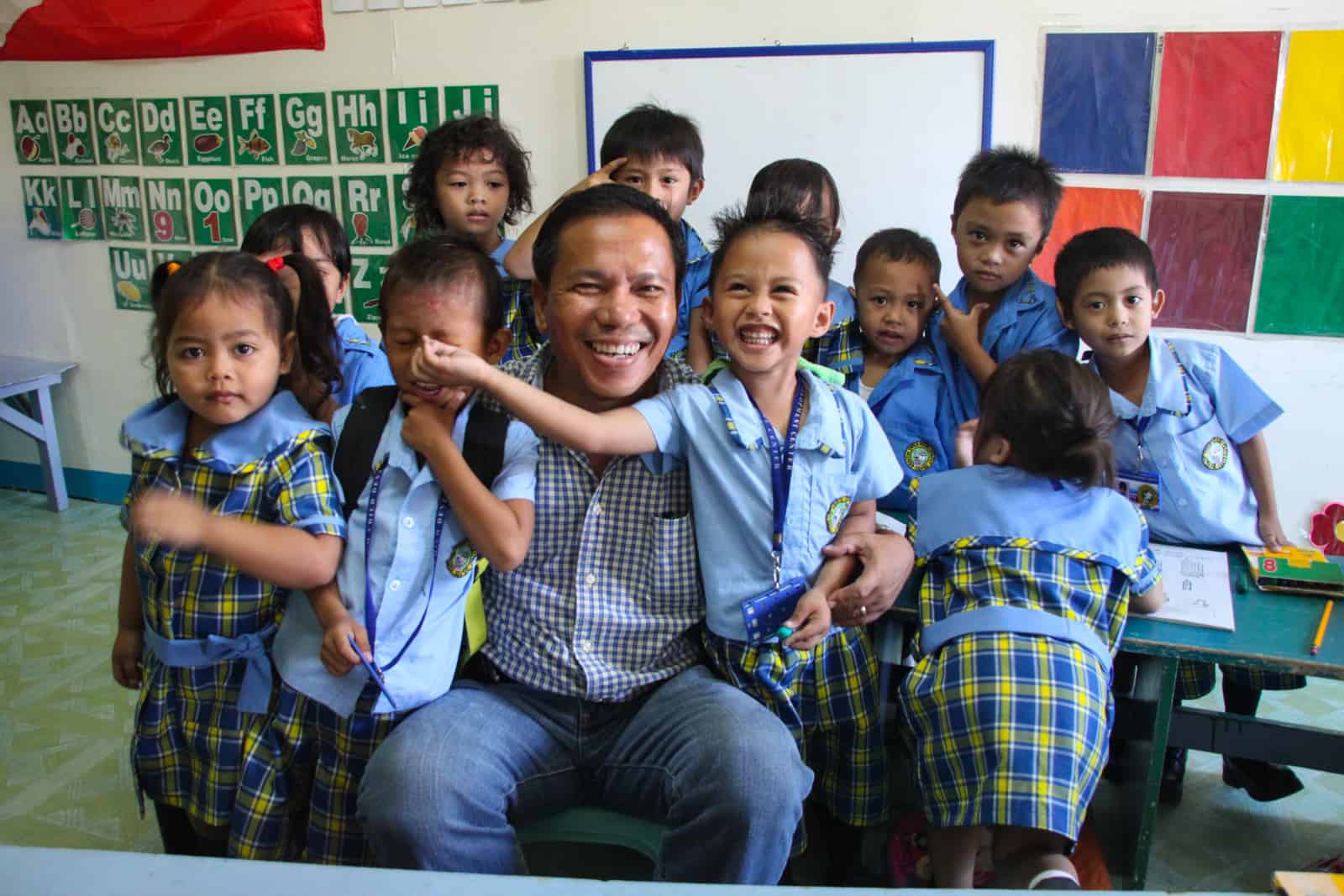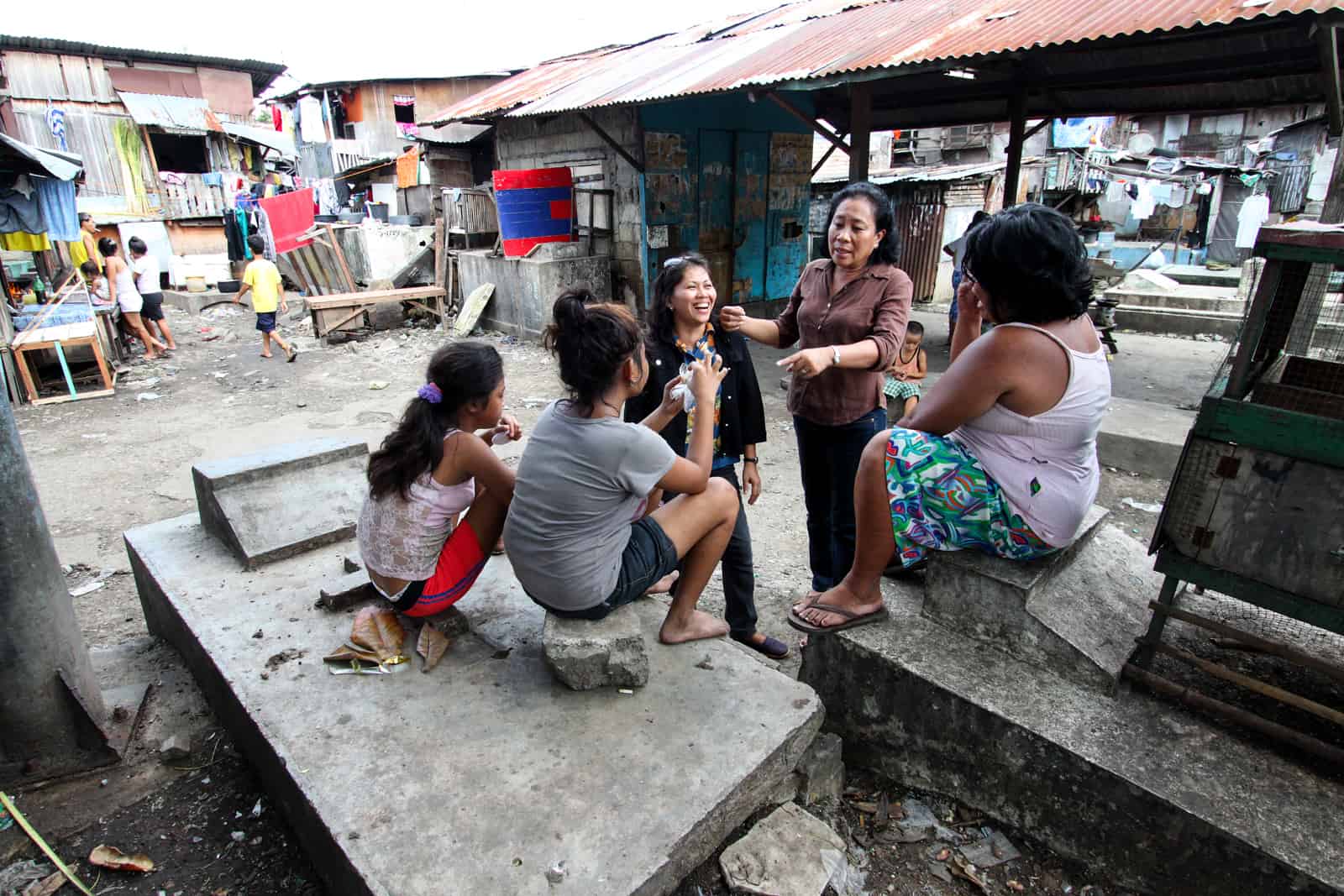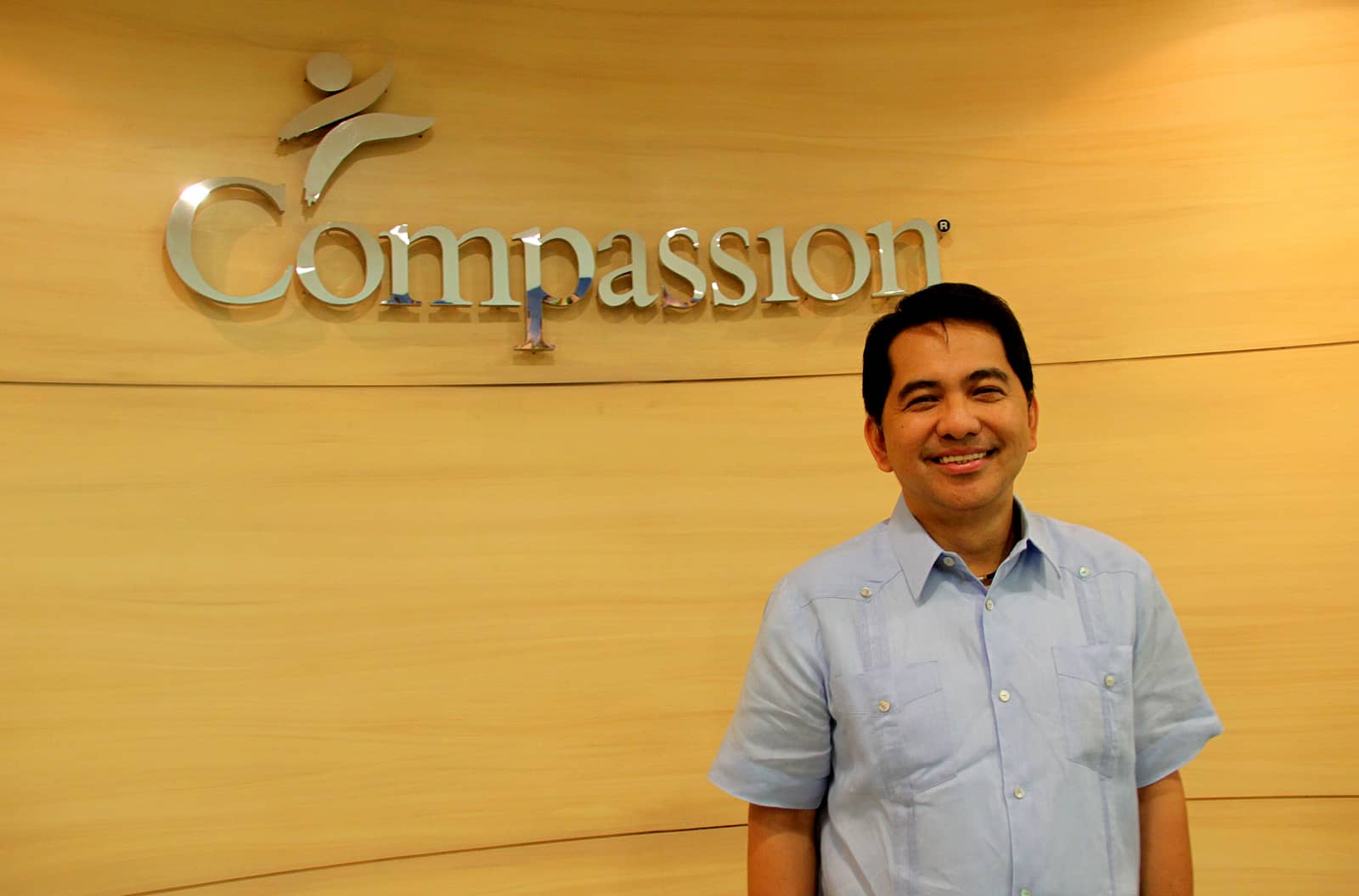Compassion Philippines is partner to 340 local churches from 17 Christian denominations. While normally denominations such as Baptists and Pentecostals in the Philippines would not see eye to eye in matters of doctrine and practice, our church partners work together very well regardless of denominational differences.
“We used to feel superior over the other denominations,” says Romy Villarta, pastor of the Cebu Shalom Family Ministries Assembly of God Church, a Pentecostal church in Cebu City. “But now our church is very close with several Baptist churches and Alliance churches, especially those that are also partners of Compassion.

Pastor Romy is very comfortable and natural with the children in the program.
“We felt superior because we believe in the gifts of tongues and healing, but other denominations don’t. But now we respect other faiths and find it excellent that we can cross barriers with other denominations.”
Ian Aloy is pastor of the Mactan Cathedral of Faith, a church partner of ours in Cebu since 2000. He has heard of worse conflicts between denominations.
“I knew that about 30 years ago evangelicals and Pentecostals killed each other. For me, interdenominational cooperation is very good. I have learned a lot from other denominations.”
Pastor Wenefredo Po agrees with Villarta and Aloy. Po is the pastor of the Mabolo Evangelical Free Church, a partner of Compassion also in Cebu since 1984.
“God is using Compassion to break the barriers of denominationalism. I know of Baptist churches fighting with Pentecostal churches, but I know that that will never happen to us [church partners of Compassion].”
Our church partners in Cebu have bonded together to conduct several interdenominational activities, which include seminars, fellowship, sporting events and child protection efforts.
“We are especially united in child protection issues,” Pastor Po adds. “We banded together side by side in fighting child abuse cases. We were organized by Beth Tabasa as we linked up with UNICEF Philippines, which is now focusing their child protection activities in partnership with faith-based organizations.”
Beth Tabasa is the director of Loving My Neighbor Student Center for the Cebu City Alliance Church. The Cebu City Alliance Church is located at the center of Cebu City’s “red light district.” They minister to drug pushers, sex peddlers and prostitutes.
Beth believes that because of these societal influences, “it was inevitable for a few of our registered children to be tempted into entering the flesh trade.”

Beth Tabasa talks with women in the Lorega slum in Cebu City in the Philippines.
From the discussions they have had with UNICEF Philippines, our church partners have learned that the Philippine government has identified Cebu City as one of the country’s top five areas for child prostitution and sex tourism. It is a leading destination for trafficking children as young as 11 to 17 years of age.
Two years ago, Loving My Neighbor Student Center rescued a 14-year-old sponsored girl who was lured into prostitution. With the help of International Justice Mission (IJM) and the Department of Social Welfare and Development (DSWD), the young lady is now recovering in a shelter for abused women and children. After much counseling, she finally opened up to Beth and admitted that it was really poverty that pushed her. Nobody forced her, but she blamed herself.
Beth was moved and decided to encourage other student centers to learn and engage more in child protection issues. She later learned that another center in Cebu had five cases of child abuse.
Today, church partners in Cebu feel that they are more equipped in handling child abuse cases.
Pastor Po said, “We now stand side by side, united in protecting our children.”
They believe that they can accomplish more for the children if they work together because if they work alone, Beth believes that “our ministry is limited.”
“We don’t need to create anything new. We just need to connect with other groups or denominations that are very good in things that we can’t do. We should help each other out.
“I am very happy. I know I can’t do all. I know Compassion can’t do all. That’s why we help each other. I was able to meet different organizations and tap many networks in order to save children. Connecting with other denominations is very helpful.”
We have 22 church partners in Cebu, representing seven different denominations. These churches minister to about 6,000 children, and the load becomes lighter as they join hands in interdenominational cooperation.
They come together to tackle issues that are as serious as child protection and as light as sharing a cup of coffee. Pastor Villarta revealed that he has agreed with Pastor Alfafara (a Baptist pastor) and Pastor Tabasa (an Alliance pastor) to meet at least once a week for coffee.
“We just agreed to enjoy each other’s company and not talk about anything serious.”
The need for churches to join hands in interdenominational cooperation is true in Cebu as it is all over the islands. While Christians are not persecuted in the Philippines, the main challenge of the church in the Philippines is the rift brought about by denominationalism.
“Philippine evangelical churches are not as united as we hope them to be,” said Rosalinda Cosico, Program Director of Compassion in the Philippines. “This is why we have initiated pastoral wellness trainings to encourage our church partners to unite, especially in advocating for the children.”
Our country office recently facilitated a series of Church Leadership and Development Trainings for its partner pastors all over the country.

Noel Pabiona in the Compassion Philippines office.
Noel Pabiona, the National Director said,
“My vision is that the country office will serve as a catalyst for unity that breaks down the invisible barrier of denominationalism.”
Church partners appreciate what we are doing for them. Pastor Romy Villarta declares, “Because of interdenominational cooperation, we are convinced that Compassion operates with the Body of Christ, and not just for organizations.”






2 Comments |Add a comment
A men I agree this was an awesome read
I love this… love the picture. Jesus is Jesus….
I love reading this compassion blog.
So thankfu for Compassion….
blessings,
Teena